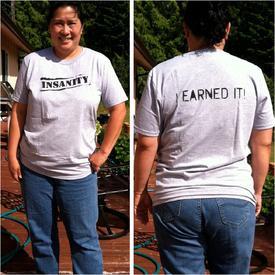'you'll put weight straight back on'

ashleeliza
Posts: 93 Member
I read here and there don't follow these diets etc because you'll put the weight you lose straight back on.
Why is this?
Surely if you stay under your tdee you wont put any weight back on?
Also I see people say if you eat low calories, you'll put weight on quicker when you start to eat more, does this apply to? Can someone explain this to me? Thankyou
Why is this?
Surely if you stay under your tdee you wont put any weight back on?
Also I see people say if you eat low calories, you'll put weight on quicker when you start to eat more, does this apply to? Can someone explain this to me? Thankyou
0
Replies
-
I believe this is in reference to the fact that when people "stop" dieting they usually resume whatever eating habits they had before dieting and will put on weight again.
That's the whole point of making it a lifestyle change, not going back to the old way of eating/drinking and/or lack of exercise.0 -
Personally, I pretty much know what I did to put on the weight and I stopped a long time ago. I had to turn around one aspect of my life at a time to get to the point where I could start taking off weight. For me, since I messed myself up a bit with high amounts of caffeine/sugar/energy drinks I had to get off that dependency before I could do anything else. I don't expect to go down that route again lol.0
-
This often happens when people follow stupid diets (eat only cabbage, eat only meat, eat nothing but peanut butter). These are unsustainable and so when one stops the diet, they go back to their old ways, rather than swtiching to a healthier lifestyle.0
-
I read here and there don't follow these diets etc because you'll put the weight you lose straight back on.
Why is this?
Surely if you stay under your tdee you wont put any weight back on?
Also I see people say if you eat low calories, you'll put weight on quicker when you start to eat more, does this apply to? Can someone explain this to me? Thankyou
this is mostly true for people who are obese and lose weight quickly.
regardless of what some people want to say or believe, no one gets to be obese by accident or eating less calories than their body needs and considering how much time it takes to become that overweight (it took me a good 8-10 years to become 80 pounds overweight), that means they have years to practice and reinforce bad habits.
going to the opposite extreme for a few months- half a year to lose a lot of weight quickly is more than likely no going to give that person enough time to relearn good habits. so they may be able to suffer through a VLCD for 6 months but then once they get back to eating normal, they will more than likely default back to whatever their normal was that made them gain weight in the first place.
plus, there's almost always some emotional and psychological issues with why people are OK with being obese. if those issues arent dealt with (which would be hard to do in quick weight loss) then they'll more than likely lead to weight regain.0 -
I read here and there don't follow these diets etc because you'll put the weight you lose straight back on.
Why is this?
Surely if you stay under your tdee you wont put any weight back on?
Also I see people say if you eat low calories, you'll put weight on quicker when you start to eat more, does this apply to? Can someone explain this to me? Thankyou
Because certain restrictive dietary practices cause you to drop weight not bodyfat, dehydrating you or burning muscle which reduces the metabolism. Once you start eating normally again you rehydrate but the muscle is still gone so fat gain is easier.0 -
You will only put back on if you "diet"..if you are making a life change and not depriving yourself it should be manageable..0
-
When I spoke too my doctor about my weight loss she suggested making a lifestyle change and not doing a "diet" especially one that has a really low calorie intake like the cabbage soup diet or a juice cleanse because going from say eating 1,500 calories a day to 500 a day would trigger like a survival mode in your body so even though you lost 10 pounds your body will store fat as insurance so you'd gain all the weight back plus some!
Just some food for thought, but everyones body is different and i'm not saying doing one of those diets is bad I love a 3 day juice cleanse to restart my system but never use it as a way to loose a lot of weight! 0
0 -
I think the best path for success is to make changes you will stick with. Too many people change everything all at once, and then realize that the changes aren't things they can maintain.
Another poster commented that they needed address other issues (with sugar and caffeine) before getting into the mindset to lose weight.
You need to figure out your own roadblocks to put yourself on the path to success.
I know for me personally, I have issues with time and putting myself first when things are busy. For me, eating habits aren't always the issue, I go in seasonal waves of eating well and eating too many sweets. So I have to find alternatives and limit portions appropriately during those times.
I also have problems fitting in exercise and balancing the need to keep my energy up when I am not sleeping enough. So it seems to come down to sleep or exercise.
Anyway, figure out your roadblocks, and challenges. Figure out what you are willing to maintain for life in terms of diet and activity level. For me, I know I am not really going to be little miss gym rat, so I need to focus on increasing my daily activity and creating effective workouts for around 3 hours a week. I won't really fit in more than that to be perfectly honest.
Good luck. My personal goals/resolutions and what have you?
1. Drink mostly water
2. Try to leave the treats for 2-3 days a week
3. Eat more veggies, double up at dinner time
4. Do a couple of workouts before work 1-2 days a week
5. Make my errands walking ones, to rack up a couple of extra miles a week
6. Tame the dessert cravings with lower calorie alternatives (woohoo chocolate mint tea!)
7. Get enough sleep
8. Plan for the days when I know they'll be full of temptations (dinner out, happy hour etc) by eating less earlier
Good luck!
I know it will take me longer to reach my goals....but I have better odds of staying there with an easier plan.0 -
I lost 15 Kgs using Jenny Craig and kept it off for a year BUT I didn't make the mental change to make it a lifestyle change rather than a diet so 5 years later I had put on more than I lost. Doing it this way I am not obsessing about what my next meal will be as I finish the one I am eating nor am I planning ahead to when I reach goal weight and can eat 'real food ' again.
This time I am not dieting, I am changing my eating habits understanding that it needs to be a forever change.0 -
You need to make a lifestyle change, not just a simple diet. I know a few people who have dieted then put the weight back on after when they resumed their old eating habits.0
-
Here is the abstract to a study that explains why many people who pursue VLCD do gain back the weight and end up with even higher fat mass than they had during their initial composition. This principle is also true for anorexics, for example, who regain a disproportionate amount of fat during weight recovery.
http://www.ncbi.nlm.nih.gov/pubmed/8696417Autoregulation of body composition during weight recovery in human: the Minnesota Experiment revisited.
Dulloo AG, Jacquet J, Girardier L.
Department of Physiology, Faculty of Medicine, University of Geneva, Switzerland.
Abstract
OBJECTIVES:
To gain insights into the control systems underlying human variability in the regulation of body composition during weight recovery, as well as the disproportionate recovery of fat relative to lean tissue, the classical Minnesota Experiment conducted on 32 men subjected to long-term semi-starvation and refeeding was revisited with the following objectives: (1) to determine whether the control of energy-partitioning between lean and fat tissues during weight loss and weight recovery is an individual characteristic, and if a predictor can be statistically identified, (2) to determine whether the reduction in thermogenesis during weight loss persists during weight recovery, and underlies the disproportionate recovery of fat tissue and (3) to integrate the control of energy-partitioning and that of thermogenesis in order to explain the pattern of lean and fat tissue mobilisation and deposition during weight loss and weight recovery.
METHODS:
Individual data on body weight, body fat, fat-free-mass (FFM), and basal metabolic rate (BMR), assessed during the control baseline period (i.e. prior to weight loss), at the end of 24 weeks of semi-starvation, and at the end of a 12 week period of restricted refeeding, were used to calculate the following parameters: (i) a quantitative index of energy-partitioning, the P-ratio, defined as the proportion of body energy mobilised as protein during weight loss, or as the proportion of body energy deposited as protein during weight recovery, (ii) a quantitative index of changes in thermogenesis, defined as the change in BMR adjusted for FFM (or for both FFM and fat mass) and (iii) the degree of replenishment of fat and FFM compartments, defined as the recovery of body fat and FFM (during refeeding) as a percentage of that lost during semi-starvation.
RESULTS:
This re-analysis indicates the following: (i) a large inter-individual variability in P-ratio during both weight loss and weight recovery, but for a given individual, the P-ratio during refeeding is strongly correlated with the P-ratio during semi-starvation, (ii) body composition during the control period is the most important predictor of variability in P-ratio, such that the higher the initial % body fat, the lower the proportion of energy mobilised as protein, and hence the greater the propensity to mobilise fat during semi-starvation and to subsequently deposit fat during refeeding and (iii) at week 12 of refeeding, the change in adjusted BMR is found to be reduced by a magnitude which is inversely proportional to the degree of fat recovery, but is unrelated to the degree of FFM recovery. A quantitative relationship is derived between the P-ratio during refeeding, the % fat recovery, and the P-ratio during semi-starvation.
CONCLUSIONS:
Evidence is presented here suggesting that (i) human variability in the pattern of lean and fat tissue deposition during weight recovery is to a large extent determined by individual variations in the control of energy-partitioning, for which the initial % body fat is the most important predictor and (ii) the disproportionate gain in fat relative to lean tissue during weight recovery is contributed by a reduction in thermogenesis (i.e. increased efficiency of food utilization) for accelerating specifically the replenishment of the fat stores. These control systems, operating via energy-partitioning and thermogenesis, have been integrated into a compartmental model for the regulation of body composition during underfeeding/refeeding, and can be used to explain the individual pattern of lean and fat tissue deposition during weight recovery in situations ranging from the rehabilitation after malnutrition to the relapse of obesity.
To put it simply, when people abruptly reduce net calories on VLCDs, and chronically maintain doing so, they are increasing the magnitude of alterations that naturally occur during any degree of deficit: namely a greater depression in Resting Metabolic Rate and loss of fat-free mass. During fat loss, fat-free mass is sacrificed as well - but when that person regains the weight, only a very small percentage of that fat-free mass is recovered. Consider, too, persons may eat well above their depressed RMR and TDEE before both have time to recover. The disproportionate fat regain relative to fat-free mass is a result of the above two occurring whereby a person sometimes ends up with a higher fat mass than before the intervention.0
This discussion has been closed.
Categories
- All Categories
- 1.4M Health, Wellness and Goals
- 397.1K Introduce Yourself
- 44.2K Getting Started
- 260.9K Health and Weight Loss
- 176.3K Food and Nutrition
- 47.6K Recipes
- 232.8K Fitness and Exercise
- 457 Sleep, Mindfulness and Overall Wellness
- 6.5K Goal: Maintaining Weight
- 8.7K Goal: Gaining Weight and Body Building
- 153.4K Motivation and Support
- 8.3K Challenges
- 1.3K Debate Club
- 96.5K Chit-Chat
- 2.6K Fun and Games
- 4.6K MyFitnessPal Information
- 16 News and Announcements
- 18 MyFitnessPal Academy
- 1.4K Feature Suggestions and Ideas
- 3.1K MyFitnessPal Tech Support Questions









